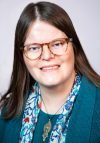- Eleanor Roosevelt sought counsel from Otto Frederick Nolde, a Lutheran scholar, as she chaired the U.N. Commission on Human Rights. Photo: Lutheran Archives Center at Philadelphia
- J.P. Van Heest, president of the Evangelical Lutheran Church in the Netherlands, signs the first constitution of the Lutheran World Federation at the 1947 Lund Assembly. Photo: The Lutheran World Federation
Editor’s note: With global migration on the rise and cultural polarization increasing, there is a pressing need for peace among neighbors and nations. In this six-part series, “Lutheran legacy of peacemaking,” we’re exploring Lutheran contributions to the Christian tradition of peacemaking. The series will culminate in the September issue in conjunction with the International Day of Peace (Sept. 21).
In 1945, during the waning months of World War II, 50 allied nations gathered in San Francisco to draft the U.N. charter. The gathering laid the foundation for an era of global engagement championed by President Franklin D. Roosevelt, who died days beforehand. His wife, Eleanor, espoused his work, becoming a U.S. delegate to the U.N. As chair of the U.N. Commission on Human Rights, she oversaw the creation of the Universal Declaration of Human Rights. During this process, she sought counsel from many, including Otto Frederick Nolde, a professor of Christian education and dean of the graduate school at the Lutheran Theological Seminary at Philadelphia.
The Lutheran scholar soon became one of the most influential voices of faith, diplomacy and peace on the global stage.
A tenacious advocate
Nolde “became the leading ecumenical diplomat, and most well-known nongovernmental organization representative, lobbying for ecumenical goals at the U.N.,” wrote John S. Nurser in For All Peoples and All Nations (Georgetown University Press, 2005). He praised Nolde’s ability to persuade diplomats, draft documents and tenaciously advocate for an ecumenical agenda.” Nolde’s gifts for diplomacy made him one of Eleanor Roosevelt’s most influential allies.
His influence could be seen in the World Council of Churches (WCC), an ecumenical organization founded in 1948 to unify and pool resources where commonalities existed. Nolde was selected to lead a new WCC working group, the Commission of the Churches on International Affairs, as it “pushed for the creation of a commission on human rights, for drafting a declaration of human rights, and, within this, for the protection of religious liberty in the broadest possible terms,” wrote historian Jill K. Gill (“Book Review of ‘For All Peoples and Nations: The Ecumenical Church and Human Rights by John S. Nurser’ ”; Peace & Change, June 2006).
A bridge-builder between the sacred and secular realms of peacemaking, Nolde’s biggest contribution was the drafting and adoption of the Universal Declaration of Human Rights on Dec. 10, 1948, of which he authored Article 18: “Everyone has the right to freedom of thought, conscience and religion; this right includes freedom to change his religion or belief, and freedom, either alone or in community with others and in public or private, to manifest his religion or belief in teaching, practice, worship and observance.”
Nolde went on to contribute over two decades to the work of international and faith-based peacemaking. He died in 1972 at the age of 73.
“Everyone has the right to freedom of thought, conscience and religion; this right includes freedom to change his religion or belief, and freedom, either alone or in community with others and in public or private, to manifest his religion or belief in teaching, practice, worship and observance.”
Through it all, his Lutheran faith led him to tirelessly pursue peace. Nolde wrote in 1951 that he believed “[churches] must cultivate in our people the moral restraints which will keep military strength under control and indicate the direction to be followed in order that strength may contribute to peace.”
A lasting impact
Nolde’s legacy continues today. His influence in the global peace movement can be seen in The Lutheran World Federation (LWF). Representing more than 74 million Christians in the Lutheran tradition in 98 countries, the LWF continues the work of unity, restoration and reconciliation throughout the world.
One way the LWF’s work is carried out is through the Lutheran Office for World Community (LOWC), founded in 1973. Located adjacent to the U.N. headquarters in New York City, the office communicates social policy stances of the LWF and ELCA to the U.N. and relays back how those issues are being addressed. It’s an opportunity for international Lutherans to have their voices heard within the framework of the U.N.
Nolde’s commitment to human rights continues, as Dennis Frado, LOWC director, explained: “All people are created in the image of God and therefore are of equal worth and dignity. This means that the distinctions we have created, based on ethnicity, race, gender, nationality and other factors, are human-made and, therefore, we need to work for the common good of all people everywhere.” The LOWC carries this forward.
Frado’s words echo Nolde, whose voice continues to be relevant today. Nolde wrote: “[U.S.] national policy ought to flow from a profound concern for people—for all people in every land—with a penetrating understanding that our interests are best served when we serve the interests of others.”






